Generative AI Driving Better Customer Support Experiences

Generative AI is revolutionizing customer service by providing faster and more personalized support. Wondering how can generative AI enhance customer support? By 2025, 42% of contact centers plan to adopt AI, with businesses already leveraging it reporting a 37% reduction in first response times and a 52% improvement in ticket resolution speed. This shift highlights the increasing demand for instant, customized solutions. Companies also benefit from a 35% cost reduction and a 32% revenue increase through AI integration. Sobot, a pioneer in customer support innovation, equips businesses with advanced tools like omnichannel solutions and AI-powered live chat, ensuring seamless and efficient customer experiences across multiple platforms. This transformation not only boosts operational efficiency but also redefines the way businesses engage with their customers.
Understanding Generative AI in Customer Support
What Is Generative AI?
Generative AI refers to a branch of artificial intelligence that creates new content, such as text, images, or even audio, based on patterns it has learned from existing data. In customer support, this technology powers tools like conversational AI bots and virtual assistants. These systems can simulate human-like interactions, providing dynamic and personalized responses to customer inquiries. Unlike traditional AI, generative AI doesn’t just follow pre-set rules. Instead, it learns and adapts, making it a game-changer for customer service.
For example, generative AI can analyze vast amounts of customer data to predict needs and offer tailored solutions. This capability allows businesses to deliver faster and more accurate support, enhancing the overall customer experience.
How Can Generative AI Enhance Customer Support?
Generative AI transforms customer support by improving efficiency and personalization. It enables businesses to provide multilingual support, breaking down language barriers and expanding their global reach. For instance, a major tech company used AI-driven translation services to enhance interactions across regions. Additionally, generative AI excels at sentiment analysis, helping businesses understand customer emotions. A leading hotel chain leveraged this feature to address negative feedback promptly, boosting satisfaction rates.
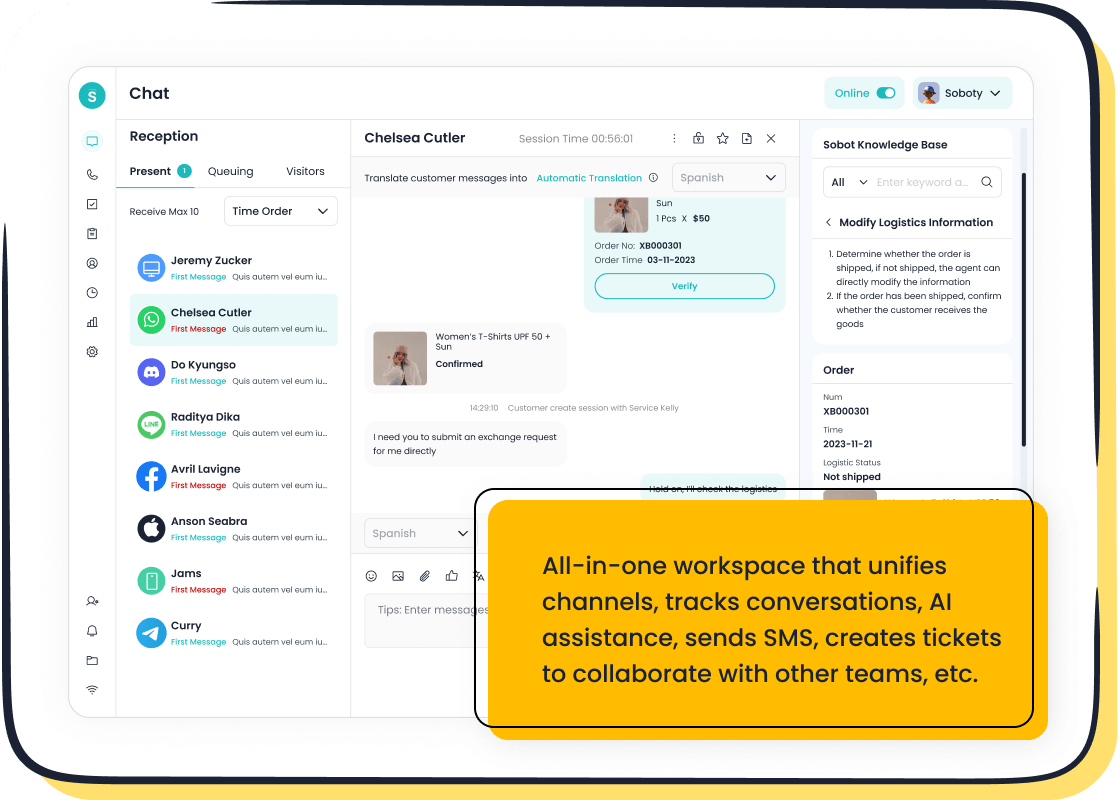
Sobot’s Live Chat exemplifies how generative AI enhances customer support. Its AI-powered tools enable agents to respond quickly and accurately, even during peak times. By integrating customer data into a unified workspace, Sobot ensures seamless and efficient service. This approach not only reduces response times but also fosters customer loyalty.
Key Applications of Generative AI in Customer Service
Generative AI offers diverse applications in customer service, including:
| Application | Description |
|---|---|
| Chatbots and virtual assistants | Resolve low-complexity tickets and answer frequently asked questions. |
| Content generation | Help agents create educational materials for help centers. |
| Language translation | Overcome language barriers to assist customers worldwide. |
| Personalized support | Deliver dynamic, tailored conversations to enhance engagement. |
| Knowledge acquisition | Learn from historical data to improve responses over time. |
Real-world examples highlight its impact. Delta Airlines’ chatbot, "Ask Delta," reduced contact center volume by 20%. Similarly, SmileDirectClub uses AI-driven virtual assistants to enhance patient care. These applications demonstrate how generative AI streamlines operations and improves customer satisfaction.
Sobot’s omnichannel solution integrates these capabilities, offering businesses a comprehensive platform to manage interactions across multiple channels. By automating repetitive tasks and providing actionable insights, Sobot empowers support teams to focus on complex issues, driving efficiency and satisfaction.
Benefits of Generative AI for Customer Support Teams

AI-Driven Personalization for Enhanced Customer Experiences
Generative AI enables you to deliver hyper-personalized customer experiences by analyzing vast amounts of data to understand individual preferences. This technology allows you to anticipate customer needs and provide proactive recommendations, creating a seamless and engaging interaction. For example, AI-powered virtual agents can tailor responses based on a customer’s purchase history or browsing behavior, ensuring every interaction feels unique.
Sobot’s omnichannel solution exemplifies this transformation. By integrating customer data across platforms, it empowers your team to offer consistent and personalized support. This approach not only improves engagement but also fosters customer retention. According to NNGroup studies, generative AI tools have improved task performance by 66%, significantly enhancing customer-centric outcomes. With AI-driven personalization, you can elevate your customer service strategy and build lasting relationships with your customers.
Improving Efficiency with Sobot's Live Chat
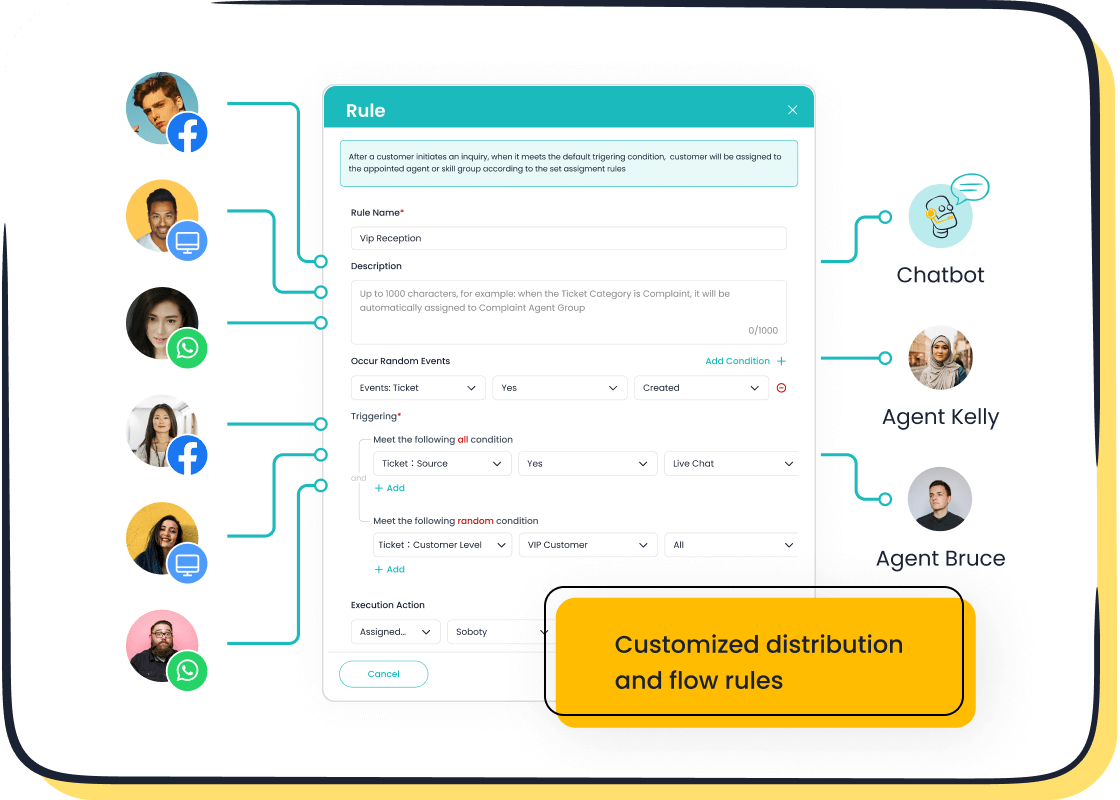
Efficiency is critical in customer support, and generative AI excels in this area. Sobot’s Live Chat solution leverages AI to streamline operations and reduce response times. Its AI-powered tools enable real-time query processing, ensuring your customers receive prompt assistance. By automating repetitive tasks, such as answering FAQs, Sobot allows your agents to focus on complex issues that require human empathy.
Recent case studies highlight the impact of Sobot’s platform. AI algorithms are projected to handle up to 95% of customer interactions by 2025, significantly improving operational efficiency. Additionally, Sobot’s unified workspace consolidates customer data, enabling agents to resolve queries faster. This efficiency not only enhances the customer experience but also aligns with emerging customer service trends. By adopting Sobot’s Live Chat, you can transform your support operations and achieve measurable results.
Scalability and Cost Optimization in Customer Service
Generative AI offers unparalleled scalability, allowing you to expand your customer service operations without significant infrastructure changes. AI systems can handle increasing volumes of customer interactions, ensuring consistent service quality during peak periods. This scalability is particularly valuable for businesses experiencing rapid growth or seasonal demand fluctuations.
Sobot’s solutions provide a cost-effective way to optimize your customer service strategy. By automating routine tasks, you can reduce manual labor and operational costs. For instance, predictive analytics powered by AI can forecast demand, helping you allocate resources efficiently. According to economic reports, AI-driven contact centers achieve significant cost savings while enhancing productivity and innovation. With Sobot’s AI-powered customer service tools, you can scale your operations seamlessly and maintain high levels of customer satisfaction.
Real-Time Support Through AI-Powered Tools

Real-time support has become a cornerstone of modern customer service. Customers today expect instant responses and seamless resolutions. AI-powered tools, such as Sobot’s Live Chat, are transforming how businesses meet these expectations. These tools enable you to provide immediate assistance, ensuring that no customer query goes unanswered.
AI agents play a pivotal role in delivering real-time support. They process customer inquiries instantly, offering accurate solutions without delay. For instance, Sobot’s Live Chat uses AI to automate responses for common questions, allowing your team to focus on more complex issues. This approach not only improves efficiency but also enhances the customer experience by reducing wait times.
The integration of advanced technologies like knowledge graphs further boosts real-time support capabilities. Knowledge graphs improve contextual understanding, enabling AI agents to retrieve information instantly. According to the white paper "Powering GenAI Apps with Knowledge Graphs," this technology enhances AI systems by providing real-time information retrieval. This ensures that customers receive accurate and timely answers, even during peak hours.
Automating tasks is another key advantage of AI-powered tools. By automating repetitive processes, such as ticket routing or FAQ responses, you can free up your agents to handle more personalized interactions. Sobot’s omnichannel solution excels in automating tasks across multiple platforms, ensuring consistent service quality. This not only improves operational efficiency but also helps in enhancing personalization for your customers.
High-quality data is essential for successful real-time support. The white paper "Building a Trusted Data Foundation for AI/ML and Business Intelligence" highlights how reliable data improves business efficiency and customer service. Sobot’s AI tools leverage data analytics to provide actionable insights, helping you optimize your support strategy. For example, predictive analytics can forecast customer needs, enabling you to address issues proactively.
Real-world examples demonstrate the impact of real-time support. A global e-commerce company reduced response times by 40% using AI-powered chatbots, leading to a 25% increase in customer satisfaction. Similarly, Sobot’s Live Chat has helped businesses achieve a 38% gain in conversion rates by providing instant and accurate responses. These results show how real-time support can drive both customer satisfaction and business growth.
Incorporating AI-powered tools into your customer service strategy ensures that you stay ahead in today’s competitive landscape. By automating tasks, enhancing personalization, and leveraging real-time data, you can deliver exceptional customer experiences. Sobot’s solutions provide the tools you need to achieve these goals, empowering your team to offer unparalleled support.
Overcoming Challenges in Generative AI Adoption
Addressing Data Privacy and Security Concerns
Generative AI has transformed customer service, but it also introduces new risks related to data privacy and security. A staggering 73% of organizations report concerns about data security when adopting AI. High-profile breaches involving AI systems have highlighted vulnerabilities, such as public language models retaining sensitive information like credit card numbers. These incidents emphasize the need for robust data protection measures.
Regulations like the General Data Protection Regulation (GDPR) and the EU AI Act set strict standards for handling personal data. Businesses must ensure transparency in their AI algorithms and provide customers with control over their information. Sobot’s solutions prioritize compliance by integrating secure data management practices, ensuring your customer interactions remain protected. By adopting these measures, you can build trust and safeguard sensitive information.
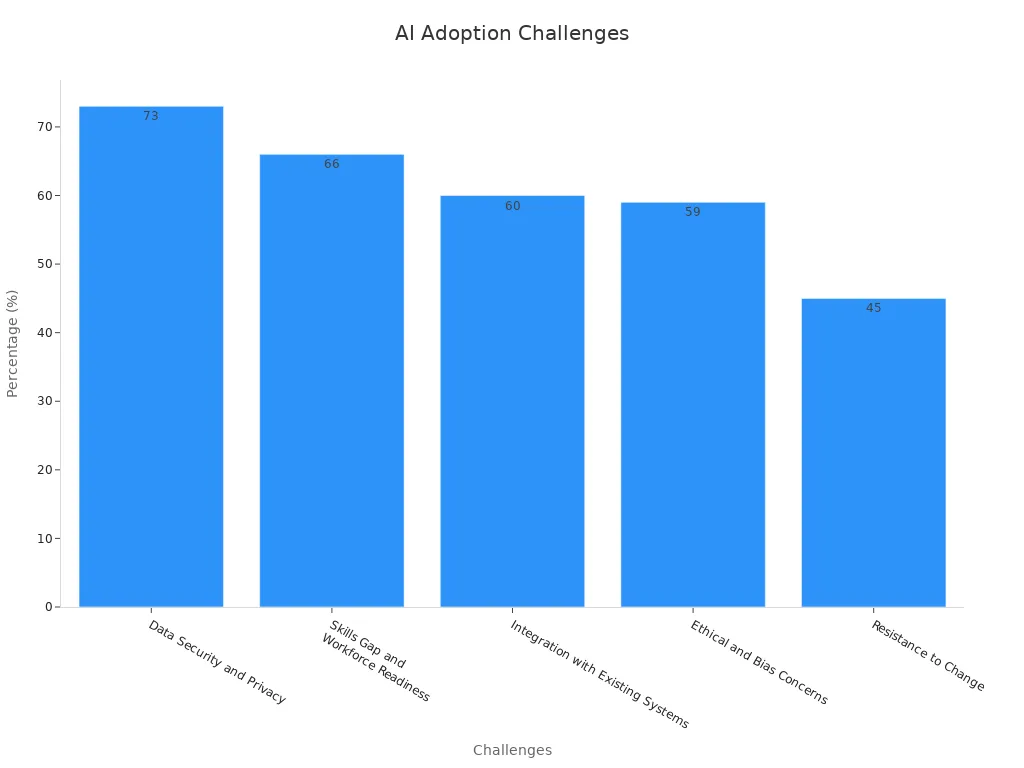
Balancing Automation with Human Empathy
While generative AI excels at automating tasks, it cannot replace the human touch in customer service. Customers value empathy and understanding, especially during complex or emotional interactions. Striking the right balance between automation and human involvement is crucial.
You can achieve this balance by using AI to handle repetitive tasks, such as answering FAQs, while reserving human agents for more nuanced conversations. Sobot’s Live Chat exemplifies this approach. Its AI-powered tools streamline routine processes, allowing agents to focus on delivering empathetic and personalized support. This collaboration ensures efficiency without compromising the human connection that customers appreciate.
Ensuring Accuracy and Reducing Bias in AI Responses
Generative AI systems must provide accurate and unbiased responses to maintain credibility. However, 59% of organizations express concerns about ethical issues and bias in AI outputs. Research shows that diverse algorithm design teams and regular audits can significantly reduce errors and biases.
For example, audits of AI systems have led to a 5.72% to 8.3% reduction in overall error rates. Sobot’s AI tools incorporate feedback loops and advanced monitoring to ensure consistent accuracy. By addressing these challenges, you can enhance the reliability of your customer service and foster trust among your audience.
| Key Findings | Details |
|---|---|
| Audit Design | Publicly naming biased performance results improved system accountability. |
| Performance Metrics | New metrics reduced errors in specific demographic groups. |
| Overall Error Reduction | Targeted audits decreased error rates by up to 8.3%. |
Building Organizational Readiness for AI Integration
Preparing your organization for AI integration requires a strategic approach. You must focus on aligning your goals, resources, and culture to embrace this transformative technology effectively. A study titled 'Ready or Not, AI Comes' identifies five critical factors for AI readiness: strategic alignment, resources, knowledge, culture, and data. These elements ensure a smooth transition and foster successful adoption.
Key Strategies for Readiness
-
Develop a Pro-AI Culture
Encourage your team to view AI as an enabler, not a disruptor. Create frameworks that promote collaboration between AI tools and human agents. For example, Sobot’s Live Chat integrates AI to handle repetitive tasks, allowing your team to focus on complex customer needs. This balance enhances efficiency and builds trust in AI systems. -
Invest in Training and Knowledge
Equip your team with the skills needed to work alongside AI. Training programs should cover AI ethics, compliance, and practical applications. According to organizational studies, understanding AI ethics ensures compliance with regulations like GDPR. This knowledge also helps you build customer trust. -
Leverage Success Stories
Learn from organizations that have successfully integrated AI. For instance, OPPO partnered with Sobot to optimize its customer service. By combining AI chatbots with human agents, OPPO achieved an 83% chatbot resolution rate and a 57% increase in repurchase rates. These results highlight the potential of AI when implemented thoughtfully.
| Key Topics | Learning Outcomes |
|---|---|
| AI and organizational culture | Create frameworks and mindsets that embrace AI across your organization. |
| AI ethics and compliance | Develop initiatives that meet compliance and ethical standards. |
| AI integration success stories | Identify lessons from organizations that have seamlessly adopted AI into operations. |
Building a Data-Driven Foundation
High-quality data is essential for AI integration. Reliable data improves decision-making and enhances AI performance. Sobot’s omnichannel solution consolidates customer data into a unified workspace, enabling you to deliver personalized and efficient support. This approach not only streamlines operations but also prepares your organization for future AI advancements.
By focusing on these strategies, you can build a robust foundation for AI integration. This readiness ensures your organization stays competitive while delivering exceptional customer experiences.
Actionable Steps for Implementing Generative AI
Setting Clear Goals for AI-Driven Customer Support
To successfully implement generative AI in customer support, you need to start by defining clear and measurable goals. These objectives should align with your broader business strategies, such as improving operational efficiency, enhancing customer satisfaction, or increasing sales. For example, you might aim to reduce response times by 30% using AI-powered chatbots or improve customer satisfaction scores by 20% within six months.
Clear goals provide a roadmap for your AI initiatives. They also help you measure success. For instance, tracking metrics like first response time, ticket resolution speed, and customer satisfaction scores ensures that your AI system delivers tangible results. A well-defined objective, such as "improving response times with an AI chatbot," is far more effective than vague goals like "enhancing business processes."
Tip: Regularly review your goals to ensure they remain relevant as customer needs evolve. This adaptability will help you maintain the effectiveness of your AI-driven customer support strategy.
Selecting the Right Tools, Including Sobot's Omnichannel Solution

Choosing the right tools is critical for implementing generative AI effectively. You need a platform that integrates seamlessly with your existing systems and supports your customer service goals. Sobot's Omnichannel Solution is an excellent example of a tool designed to enhance efficiency and customer satisfaction. It consolidates customer interactions across multiple channels, providing a unified workspace for your support team.
This solution offers several benefits. For instance, it reduces inbound discussion volume by 20% and increases customer satisfaction rates to 95%. Its AI-powered features, such as automated responses and predictive analytics, enable your team to resolve issues faster and more accurately. Additionally, the platform supports self-service options, allowing customers to find answers independently, which improves the overall customer experience.
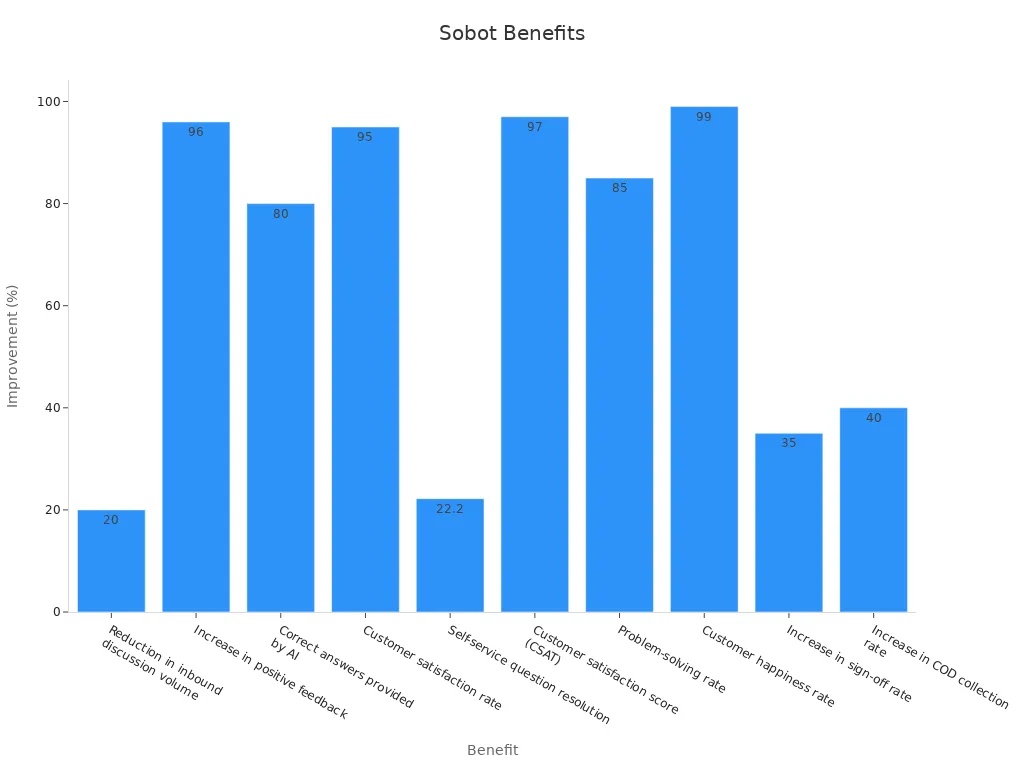
When selecting tools, prioritize platforms that offer scalability, robust analytics, and integration capabilities. These features ensure that your AI system can adapt to your business's growth and changing needs.
Training Teams for AI-Human Collaboration
Effective AI implementation requires collaboration between technology and human agents. Training your team to work alongside AI tools is essential for maximizing their potential. Start by defining evaluation criteria based on core competencies like engagement, product knowledge, and issue resolution. This approach ensures that your team understands how to use AI tools effectively.
For example, Sobot’s Live Chat integrates AI to handle repetitive tasks, such as answering FAQs, freeing your agents to focus on complex customer issues. Training programs should emphasize this collaboration, teaching agents how to leverage AI insights to provide personalized and empathetic support.
Note: Use AI tools to process and evaluate multiple calls simultaneously. Present performance data in a user-friendly format to help your team identify areas for improvement.
Ongoing assessment is also crucial. Regularly monitor performance metrics to evaluate how well your team applies their training. Incorporate employee feedback to refine your training programs, ensuring they remain relevant and effective. By fostering a culture of continuous learning, you can create a support team that excels in both AI-driven efficiency and human empathy.
Monitoring and Optimizing AI Performance
Monitoring and optimizing AI performance ensures your customer support system delivers consistent results. Regular evaluations help you identify areas for improvement and maintain high service standards. Start by tracking key performance indicators (KPIs) like response time, resolution rate, and customer satisfaction scores. These metrics provide a clear picture of how well your AI tools are performing.
Sobot’s omnichannel solution simplifies performance monitoring. Its built-in analytics evaluate over 150 indicators, offering actionable insights to optimize your customer service strategy. For example, you can use these insights to adjust workflows or refine AI algorithms for better accuracy. This proactive approach ensures your AI system evolves alongside your business needs.
Feedback loops play a crucial role in optimization. Encourage customers to share their experiences through satisfaction surveys. Use this data to fine-tune your AI tools. For instance, if customers report delays in responses, you can adjust your system to prioritize real-time queries. This continuous improvement process not only enhances efficiency but also strengthens customer trust.
High-quality data is essential for effective monitoring. Reliable data ensures your AI tools make accurate predictions and decisions. Sobot’s Live Chat integrates customer data into a unified workspace, enabling you to deliver personalized and efficient support. This integration helps you address customer needs proactively, improving both satisfaction and loyalty.
Tip: Schedule regular audits of your AI system to ensure it aligns with your business goals. These audits help you identify and resolve issues before they impact customer experiences.
Building Customer Trust Through Transparent AI Use
Transparency in AI-driven customer service builds trust and fosters long-term relationships. Customers want to know how their data is used and how AI systems make decisions. Clear communication about these processes reassures customers and enhances their confidence in your brand.
You can achieve transparency by providing detailed explanations of your AI tools. For example, Sobot’s solutions prioritize transparency by showing how AI algorithms work to deliver personalized support. This approach helps customers understand the value of AI in improving their experiences. Studies show that 86% of customers are more likely to trust brands offering personalized experiences based on their preferences and past interactions.
Transparency also involves respecting customer privacy. Ensure your AI tools comply with data protection regulations like GDPR. Sobot’s secure data management practices safeguard customer information, reinforcing trust. When customers feel their data is handled responsibly, they are more likely to engage with your brand.
Note: Transparency is not just about compliance. It’s about showing customers that you value their trust. Use clear language to explain your AI processes and invite feedback to improve your services.
By focusing on transparency, you can create a customer-centric approach that sets your brand apart. This strategy not only enhances satisfaction but also drives loyalty, ensuring your business thrives in a competitive market.
The Future of Customer Support with Generative AI
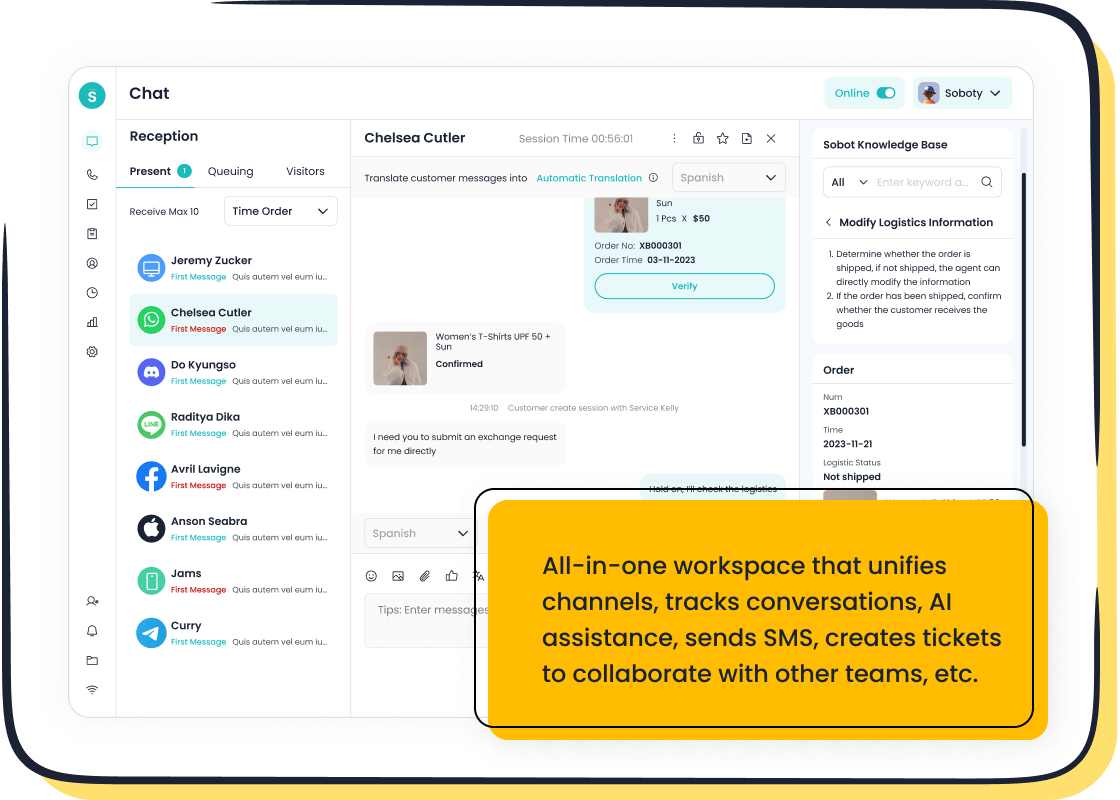
How Generative AI Will Redefine Customer Support Experiences
Generative AI is set to transform the future of customer service by 2025. It will redefine how businesses interact with customers, offering faster, more personalized, and efficient support. This technology will provide 24/7 real-time assistance, ensuring no query goes unanswered. By analyzing customer data and historical interactions, generative AI will deliver dynamic, individualized responses that enhance engagement. For example, AI-powered tools can predict customer needs and offer tailored solutions before they even ask.
The automation of repetitive tasks will also revolutionize customer support operations. Generative AI can quickly analyze interactions and generate concise summaries, allowing agents to focus on complex issues. This transformation will not only improve problem-resolution efficiency but also elevate the overall customer experience. Businesses adopting these advancements will lead the customer service revolution, setting new standards for excellence.
The Role of Human-Machine Collaboration in 2025
By 2025, human-machine collaboration will become the cornerstone of customer support. AI will handle routine tasks, such as answering FAQs, while human agents will focus on providing empathy and solving intricate problems. This partnership will create a balanced approach, combining the efficiency of AI with the emotional intelligence of humans.
| Aspect of AI Evolution | Description |
|---|---|
| Automation of Tasks | AI will automate routine tasks, allowing human agents to focus on complex issues. |
| Personalized Interactions | AI systems will enhance customer experiences through tailored interactions. |
| Chatbot Market Growth | The global chatbot market is projected to surpass $1.34 billion by 2025. |
| Emotional Intelligence | AI will utilize sentiment analysis to understand and respond to customer emotions effectively. |
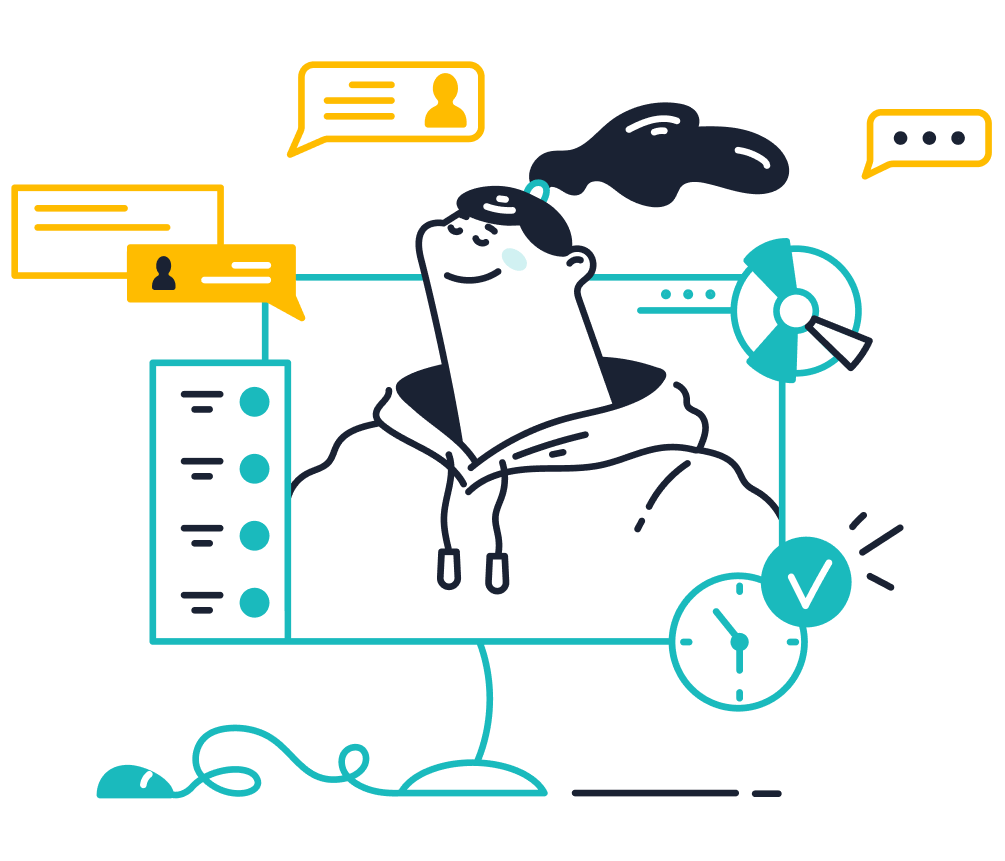
Sobot’s Live Chat exemplifies this collaboration. Its AI-powered tools streamline repetitive processes, enabling agents to deliver personalized and empathetic support. This synergy ensures that businesses can meet the evolving expectations of customers while maintaining a human touch.
Predictions for AI Innovations in Customer Service
The future of customer service will witness groundbreaking innovations powered by generative AI. These advancements will reshape how businesses engage with customers and improve service quality.
| Trend | Description |
|---|---|
| Generative AI-based training | Enhances customer service training by creating personalized scenarios for reps, improving their ability to handle diverse customer issues. |
| AI-driven personalization | Increases customer satisfaction by anticipating needs and sending tailored communications based on customer profiles. |
| Generative AI call scripts | Provides agents with real-time updated scripts and workflows, enabling them to assist customers more effectively. |
| Conversational AI bots | Offers a more human-like interaction, allowing for real-time updates and a more engaging self-service experience for customers. |
| AI-driven insights from customer data | Analyzes extensive customer interaction data to uncover patterns and inform better decision-making, enhancing overall service quality. |
| Generative AI-based FAQs | Continuously updates FAQs based on real customer inquiries, ensuring that information remains relevant and helpful for customer retention. |
These innovations will drive the transformation of customer support, making it more efficient, personalized, and proactive. Sobot’s omnichannel solution already integrates many of these features, helping businesses stay ahead in the customer service revolution. By adopting these technologies, you can ensure your business thrives in the future of customer service.
Generative AI has reshaped customer support by enhancing satisfaction, streamlining operations, and fostering collaboration between AI and human agents. Its transformative impact can be summarized as follows:
| Aspect | Impact |
|---|---|
| Customer Experience Metrics | Generative AI enhances customer satisfaction and efficiency in interactions. |
| Operational Efficiency | AI integration leads to streamlined processes and reduced response times. |
| Human-AI Collaboration | Balancing AI capabilities with human touch is essential for maximizing benefits. |
Sobot’s Live Chat exemplifies this transformation. Its AI-powered tools enable real-time responses, personalized interactions, and seamless omnichannel support, ensuring customers receive exceptional service. As AI continues to evolve, it will redefine customer engagement, offering innovative solutions that combine efficiency with empathy. By embracing these advancements, you can stay ahead in delivering outstanding customer experiences.
FAQ
What is generative AI's role in customer support?
Generative AI enhances customer support by automating repetitive tasks, offering real-time responses, and personalizing interactions. For example, Sobot’s Live Chat uses AI to analyze customer data, enabling agents to provide tailored solutions. This technology improves efficiency and ensures customers receive accurate and timely assistance.
How does Sobot ensure data security in AI-driven tools?
Sobot prioritizes data security by adhering to regulations like GDPR. Its AI tools integrate secure data management practices, ensuring customer information remains protected. For instance, Sobot’s omnichannel solution consolidates data in a unified workspace, reducing risks associated with fragmented systems.
Can generative AI handle multilingual customer queries?
Yes, generative AI supports multilingual interactions. Sobot’s Live Chat offers auto-translation, enabling seamless communication across languages. This feature helps businesses expand globally while maintaining consistent service quality. For example, a retail company used this tool to improve engagement with international customers, boosting satisfaction rates.
How does Sobot’s Live Chat improve operational efficiency?
Sobot’s Live Chat automates routine tasks like answering FAQs, allowing agents to focus on complex issues. Its AI-powered tools process queries in real time, reducing response times. Businesses using this platform have reported a 38% increase in conversion rates due to its efficiency and personalization capabilities.
What industries benefit most from Sobot’s solutions?
Sobot serves diverse industries, including retail, finance, and gaming. For example, OPPO, a global tech leader, used Sobot’s chatbot to achieve an 83% resolution rate. This adaptability makes Sobot’s tools ideal for businesses seeking scalable and efficient customer support solutions.
See Also
Enhancing Efficiency With AI-Driven Customer Service Solutions
Transforming Customer Support Through AI Service Agents
Increasing Customer Satisfaction In E-commerce With Chatbots